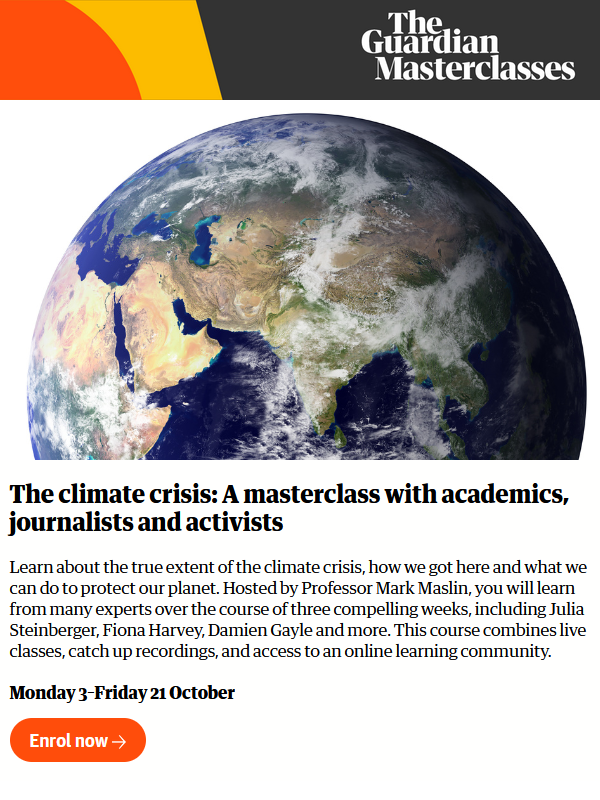
The Guardian: Climate urgency denial
The Guardian newspaper is giving inconsistent messages about the urgency of action on the climate.
In some situations, it champions climate action, but in others it continues to act as if there is no climate emergency and promotes fossil fuel use.
In one example, on consecutive days, The Guardian sent one email to subscribers announcing a masterclass on the climate crisis, and in another, promoted flying for long-haul holidays and for short city breaks.
In some situations, it champions climate action, but in others it continues to act as if there is no climate emergency and promotes fossil fuel use.
In one example, on consecutive days, The Guardian sent one email to subscribers announcing a masterclass on the climate crisis, and in another, promoted flying for long-haul holidays and for short city breaks.

Email from The Guardian 26 Sep 2022

Email from The Guardian 25 Sep 2022
The Guardian
The Guardian is an independent UK newspaper, owned by a trust (the Scott Trust).It has long had a policy of supporting action on climate change.
Mixed messages from the Guardian
The Guardian is not giving a consistent message on the urgency of action on the climate emergency. While it carries informative articles on climate change, it also has a policy of promoting aviation for holidays via its travel section.Recently, it emailed its subscribing members with the message "We've been on our long-haul summer holidays, so now we're making plans for short city breaks" (25 Sep 2022). The mailing implied that there is no climate emergency, and gradual decarbonisation is sufficient, denying that urgent radical action is required (leisure aviation is not affordable within the UK's residual CO2 budget for 1.5°C).
The following day (26 Sep 2022), it emailed its subscribing members with an inviation to a series of masterclasses on the climate crisis.
These are not isolated instances but part of a general pattern of inconsistent messaging.
Comment
The conflicting messages from The Guardian is adding to the confusion over the climate.The Guardian is not denying the facts that the climate is changing, or the interpretation that this is due to mankind, but it is denying the implications from the science that urgent radical change is needed.
If The Guardian wants to make an effective contribution to action on the climate emergency, it needs to ensure that its messaging is consistent with the IPCC.
First published: 15 Oct 2022
Last updated: 22 May 2023

 ✖
✖